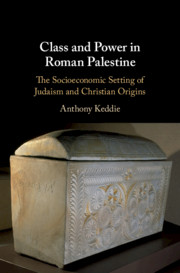Book contents
- Class and Power in Roman Palestine
- Class and Power in Roman Palestine
- Copyright page
- Dedication
- Contents
- Figures
- Tables
- Acknowledgments
- Note on the Text
- Abbreviations
- Figures
- Introduction
- CHAPTER 1 Urban Development and the New Elites
- CHAPTER 2 Land Tenancy and Agricultural Labor
- CHAPTER 3 Taxation
- CHAPTER 4 Economy of the Sacred
- CHAPTER 5 Material Culture from Table to Grave
- Conclusion
- Book part
- Bibliography
- Index of Ancient Sources
- Index of Subjects
CHAPTER 3 - Taxation
Render unto Caesar and the Local Elites
Published online by Cambridge University Press: 03 October 2019
- Class and Power in Roman Palestine
- Class and Power in Roman Palestine
- Copyright page
- Dedication
- Contents
- Figures
- Tables
- Acknowledgments
- Note on the Text
- Abbreviations
- Figures
- Introduction
- CHAPTER 1 Urban Development and the New Elites
- CHAPTER 2 Land Tenancy and Agricultural Labor
- CHAPTER 3 Taxation
- CHAPTER 4 Economy of the Sacred
- CHAPTER 5 Material Culture from Table to Grave
- Conclusion
- Book part
- Bibliography
- Index of Ancient Sources
- Index of Subjects
Summary
Chapter 3 addresses taxation in Early Roman Palestine. It divides taxes into direct taxes (tributes), which were levied by the imperial state, and indirect taxes (tolls, customs duties, sales taxes, etc.), which were more often organized at the provincial and municipal levels. The structure of direct taxation changed repeatedly in the different regions of Early Roman Palestine. In general, the rates of Roman direct taxes were relatively low compared to those of other fiscal regimes. Moreover, censuses brought some regulation to the collection of taxes and thus helped to prevent abuses by officials. While direct taxes were transmitted to Rome, their collection was supervised by councils of local elites. For many Judaeans, indirect taxes were much more exacting. These taxes were levied by local elites and collected, often with little regulation, by tax-farmers and their agents. In addition to their political and economic power over the institutions of taxation, local elites were also involved in market oversight.
- Type
- Chapter
- Information
- Class and Power in Roman PalestineThe Socioeconomic Setting of Judaism and Christian Origins, pp. 111 - 151Publisher: Cambridge University PressPrint publication year: 2019

